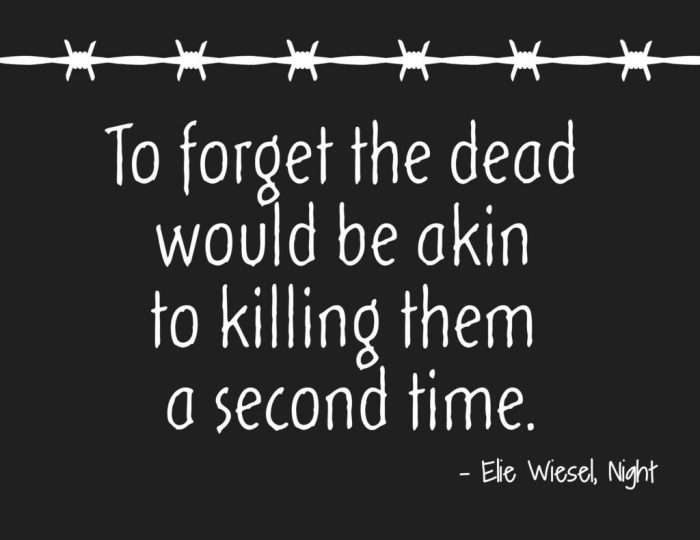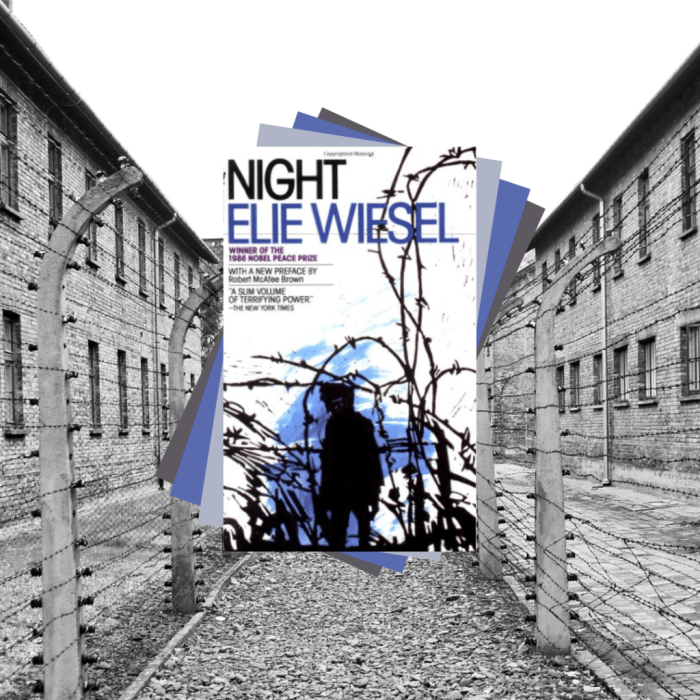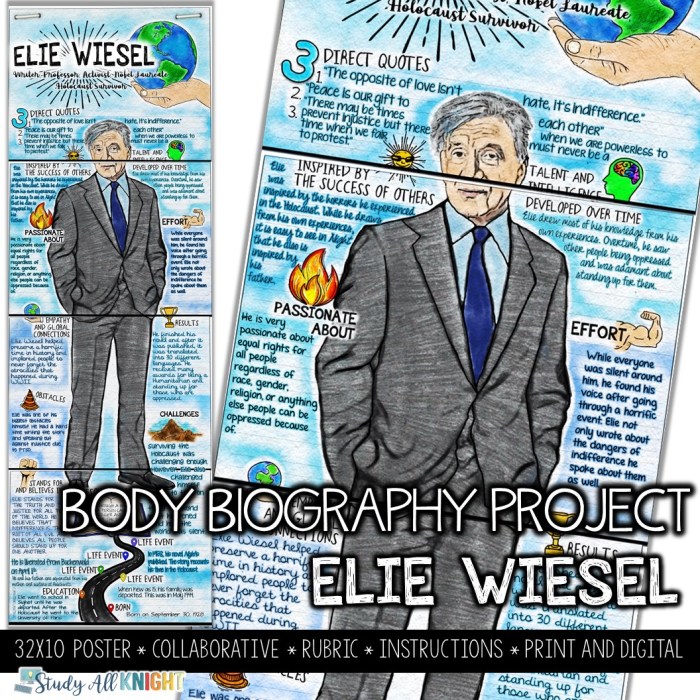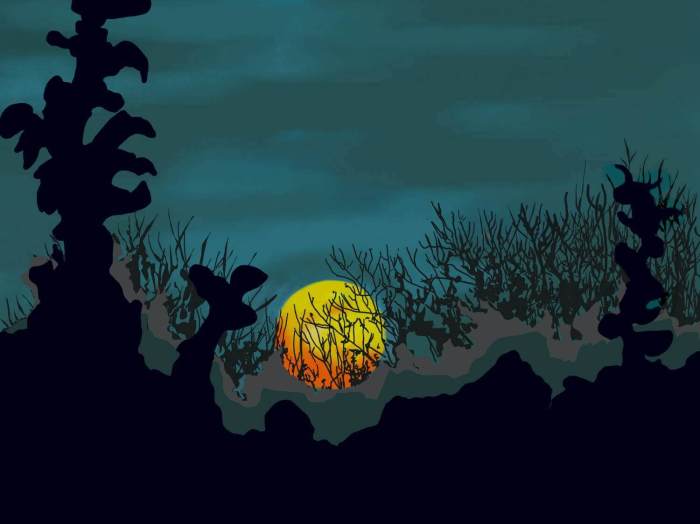Night by elie wiesel citation – Beginning with the esteemed citation of “Night” by Elie Wiesel, this exploration delves into the depths of a harrowing Holocaust memoir, capturing the essence of human resilience amidst unimaginable horrors.
Elie Wiesel’s “Night” stands as a testament to the indomitable spirit that persists in the face of adversity, offering profound insights into the complexities of the human condition.
Context of the Book

Elie Wiesel’s “Night” is a powerful memoir that chronicles the author’s experiences as a Jewish teenager during the Holocaust. The novel is set in Nazi-occupied Europe during World War II and provides a firsthand account of the horrors and atrocities committed against the Jewish people.
The novel begins with Eliezer’s family being forced to leave their home in Sighet, Transylvania, and relocate to the Auschwitz concentration camp. Eliezer and his father are separated from his mother and sisters, and they endure unimaginable suffering and brutality at the hands of the Nazis.
Through Eliezer’s eyes, we witness the horrors of the concentration camps, including starvation, disease, and the systematic extermination of millions of people.
Historical Context
The Holocaust was a genocide perpetrated by the Nazi regime against the Jewish people during World War II. Between 1941 and 1945, the Nazis systematically murdered approximately six million Jews across Europe. The Holocaust was a culmination of centuries of anti-Semitism and discrimination against the Jewish people.
The Nazis used a variety of methods to carry out the Holocaust, including mass shootings, gas chambers, and starvation. They also established concentration camps, such as Auschwitz and Bergen-Belsen, where millions of people were imprisoned, tortured, and murdered.
Main Themes

Nightby Elie Wiesel explores several profound and timeless themes, delving into the darkest depths of human suffering and the resilience of the human spirit. These themes are interwoven throughout the narrative, unfolding through the experiences of the characters and the harrowing events they endure.
One of the central themes is the destructive nature of hatred and prejudice. Wiesel portrays the devastating consequences of anti-Semitism and the dehumanization of entire groups of people. The novel exposes the horrors that can arise when hatred is allowed to fester and escalate.
The Holocaust, Night by elie wiesel citation
The Holocaust, a pivotal event in the novel, serves as a stark reminder of the horrors that humanity is capable of. Wiesel’s unflinching depiction of the concentration camps and the atrocities committed within their walls lays bare the depths of human cruelty and indifference.
Through the eyes of the young Eliezer, the reader witnesses the unimaginable suffering, loss, and degradation endured by countless victims.
In the haunting pages of Elie Wiesel’s “Night,” the chilling account of his experiences in the Holocaust, we are confronted with the horrors of human cruelty. Yet, amidst the darkness, Wiesel’s unwavering faith shines through, a beacon of hope in the face of despair.
While preparing for the IT Essentials Final Exam 1-14 , one cannot help but draw parallels to the importance of resilience and the enduring power of the human spirit that Wiesel’s “Night” so poignantly captures.
Characters and Relationships
In “Night,” Elie Wiesel introduces a diverse cast of characters who play pivotal roles in shaping the narrative. These characters’ relationships and interactions provide insights into the complexities of human behavior and the horrors of the Holocaust.
Eliezer and his Family
Eliezer, the protagonist and narrator, is a young Jewish boy whose faith and resilience are tested during his time in concentration camps. His family, including his father, mother, and three sisters, play significant roles in his life and provide support and comfort amidst the unimaginable horrors they face.
- Father:Eliezer’s father, a devout and respected man, is a pillar of strength for his family. His wisdom and unwavering faith provide guidance and hope in the darkest of times.
- Mother:Eliezer’s mother is a loving and compassionate woman who cares deeply for her family. Her unwavering love and support sustain Eliezer throughout his ordeal.
- Sisters:Eliezer’s three sisters, Tzipora, Hilda, and Bea, are young and innocent children who witness the horrors of the Holocaust alongside Eliezer. Their vulnerability and suffering highlight the devastating impact of the Nazi regime on innocent lives.
Literary Techniques

Elie Wiesel’s “Night” is a powerful and moving account of the Holocaust. Wiesel’s use of symbolism and imagery is a key element in the novel’s impact. These techniques help to create a vivid and unforgettable picture of the horrors of the Holocaust, and they also allow Wiesel to explore the complex themes of the novel.
Symbolism
Wiesel uses a number of symbols in “Night” to represent the horrors of the Holocaust. For example, the cattle cars that transport the prisoners to the camps are a symbol of the dehumanization of the Jews. The prisoners are packed into the cars like animals, and they are treated with the same cruelty and indifference.
Another symbol in the novel is the fire. The fire represents the destruction of the Jewish people and their culture. The Nazis burned down synagogues and Jewish homes, and they also burned the bodies of the dead. The fire is a powerful reminder of the Holocaust’s devastation.
Imagery
Wiesel also uses imagery to create a vivid and unforgettable picture of the Holocaust. He describes the prisoners’ starvation, their beatings, and their deaths. He also describes the horrors of the gas chambers. Wiesel’s imagery is so powerful that it is impossible to read “Night” without being deeply affected by it.
Historical Significance

Elie Wiesel’s “Night” is widely regarded as a historically accurate and poignant account of the Holocaust. The novel’s detailed descriptions of the horrors experienced by Wiesel and his fellow prisoners in Auschwitz and Buchenwald have contributed to its status as a powerful testament to the atrocities committed during the Holocaust.
Novel’s Impact on Holocaust Awareness and Education
The publication of “Night” in 1958 had a profound impact on Holocaust awareness and education. The novel’s unflinching depiction of the horrors of the concentration camps shocked and horrified readers, bringing the realities of the Holocaust to a wider audience.
Since its publication, “Night” has become a staple of Holocaust education programs worldwide. It is widely taught in schools and universities, and has been translated into more than 30 languages. The novel’s powerful narrative and personal insights have helped countless people to understand the horrors of the Holocaust and its lasting impact on survivors and their families.
In addition to its impact on Holocaust education, “Night” has also played a significant role in raising awareness of the dangers of intolerance and hatred. The novel’s exploration of the dehumanization of the prisoners in the concentration camps serves as a stark reminder of the consequences of prejudice and discrimination.
Commonly Asked Questions: Night By Elie Wiesel Citation
What is the significance of the title “Night”?
The title “Night” symbolizes the darkness and despair that enveloped Europe during the Holocaust, representing the moral and physical abyss into which humanity descended.
How does Wiesel use symbolism in “Night”?
Wiesel employs symbolism extensively throughout “Night,” using imagery such as fire, darkness, and light to convey the horrors of the Holocaust and the struggle for survival.
What is the main theme of “Night”?
The central theme of “Night” is the exploration of the human capacity for both good and evil, as well as the resilience of the human spirit in the face of unimaginable suffering.